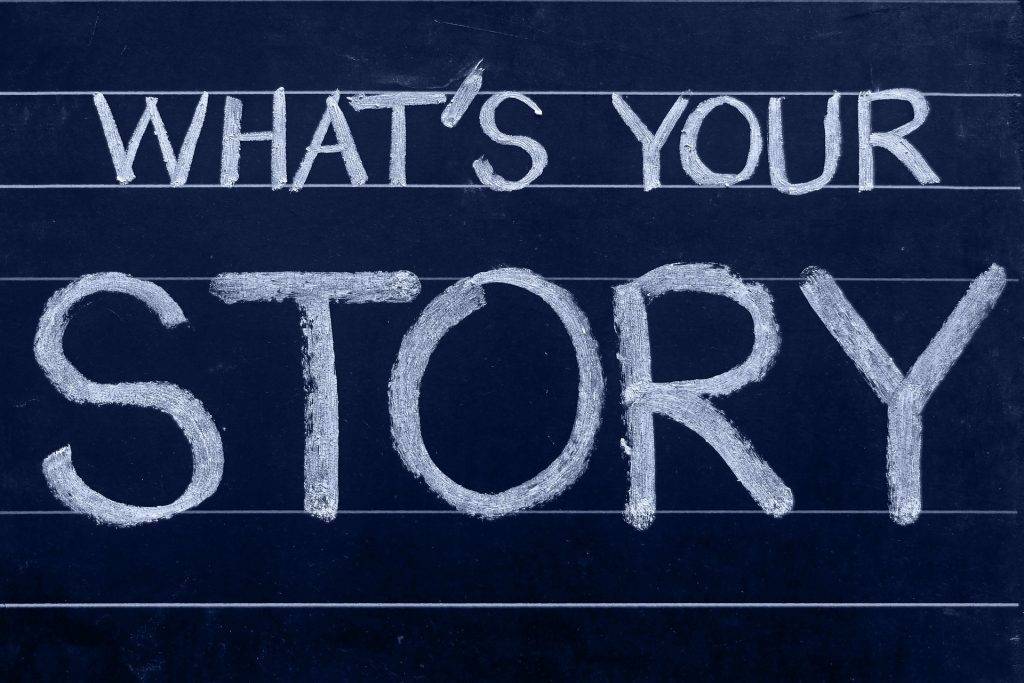The psychology of storytelling is fascinating.
Pam Allyn, the Executive Director of LitLife, a national organization specializing in innovative literacy education for schools and families, wrote an article entitled Storytelling Connects us All.

In her article, Allyn focuses on the importance of storytelling for the development of our children. Research at the Yale Child Study Center shows that storytelling is a key component of a person’s neurological development. And it is a skill that ultimately helps create a well-adjusted and resilient youth.
Stories are for everyone
Stories aren’t just for the young. As Allyn notes:
Story connects us all. Children, adults, all of us everywhere can use the magic of story to find aspects of ourselves in others, and of others in ourselves. Story reminds us that connectedness to the world does not always mean some have more and some have less, but that we all have stories and that is what brings us together.
And so we return to one of my favourite themes—the importance of telling stories. Being able to tell a compelling story is a critical public speaking skill. Audiences crave them.
In 2008, Jeremy Hsu wrote an article for Scientific American entitled The Secrets of Storytelling: Why We Love a Good Yarn. In it, he examined the work of psychologists and neuroscientists who are studying the human penchant for storytelling.
What they discovered is fascinating: The human brain likes stories.
Secrets of storytelling
Here are some key quotes that I took away from Hsu’s article:
- Storytelling is one of the few human traits that are truly universal across culture and through all of known history. People in societies of all types weave narratives. When a characteristic behaviour appears in many different societies, researchers pay attention. Its roots may tell us something about our evolutionary past.
- However narrative is defined, people know it when they feel it. Whether fiction or nonfiction, a narrative engages its audience through psychological realism—recognizable emotions and believable interactions among characters.
- The best stories captivate their audience, whose emotions can be inextricably tied to those of the story’s characters. Such immersion is a state psychologists call “narrative transport”.
- Most scientists agree that stories have a powerful and universal appeal. Indeed, the neurological roots of both telling tales and enjoying them are probably tied to crucial parts of our social cognition.
- A 2007 study found that a test audience responded more positively to advertisements in narrative form as compared with straightforward ads that encouraged viewers to think about the arguments for a product. Similarly labeling information as “fact” increased critical analysis, whereas labeling information as “fiction” had the opposite effect. Studies such as these suggest people accept ideas more readily when their minds are in story mode as opposed to when they are in an analytical mind-set.
Conclusion
The takeaway from the psychology of storytelling is, not surprisingly, to tell stories. They help us connect with audiences in a way that statistics and bullet points will never be able to do. And, as I wrote in a previous post, stories help us make our messages stick. They help us to be memorable.
And that is a happy ending for any public speaker!
















I agree with Pam and her sayings … storytelling has a good effect on children. I always tell them good stories, before they go to sleep. Always tell children stories on what good habits are and how to lead a good life!
I love this post John, with all the connections to the emotions of the receiver and story teller. All of us are wired to tell stories. After all, if you say to a small child: “Once upon a time …” What’s their reaction? When you walk into a room and see PowerPoint set up, do you immediately shout “Oh great … PowerPoint!!” If not, why not?
Thanks very much for the comment, Cordelia. I’m glad you enjoyed the post. I look forward to the day when people get excited about a PowerPoint presentation. Because that will mean that people will have started to use PowerPoint properly. Until that happy day – which is probably still a long way off – it is the stories that will engage us. “Once upon a time” are still among my most favourite words. Right up there next to “cold beer”.
Cheers!
John
Hi,
This is nice. Hope you are aware that storytelling has reached corporate world.
The last couple of years I have been reading about all aspects of storytelling. How it influences the economy, the society, leadership, authenticity, social media and so on. Interesting stuff. But then it happened to me: peer-to-peer storytelling. I connected my story to that of peers. And my peers and their matching stories helped me to come to a simple set of rules for creating your own new trade.
The last 3 years I have been guiding a lot of international companies in using storytelling as a business tool. I have given a dozen workshops and lectures about this theme to blue chip companies. I have been working with all sort of businesses, with all sort of people, at all levels. They’re all convinced about the new trade. The new trade is the new business as usual!
To make it simple and concrete I summarized my view in one sentence: It’s all about people connecting with other people by sharing their stories for everyone to repeat hoping to inspire the world and ultimately make it a better place.
What do you think about peer-to-peer storytelling?
Hi Raf and thanks for the comment. Great to see that you are spreading the word about the importance of telling stories. It is vital in today’s business world. Cheers!